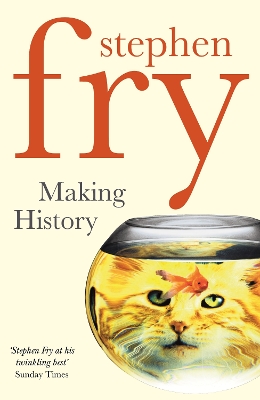Reviewed by brokentune on
Even tho I love Stephen Fry's books (and pretty much everything else he shares with the world), Making History has been lingering on my kindle without even tempting me to start this. Why is that?
Well, I unfortunately was put of by the premise that promised time travel that would culminate in the prevention of Hitler, two subjects that really don't intrigue me at all.
When I started the book, the misgivings I had with the premise continued: I liked Fry's writing but I still couldn't get to grips with reading what was in part a biography of Hitler, which, well, I had not planned on ever reading. I even found myself skimming some of those parts. It was written really well, but not something I would have engaged with if it had been by any other author.
However, I knew enough about Stephen Fry to be intrigued as to how he would handle the subject and how he would tie up the various parallel story lines.
And of course the second story line about a history student who has just submitted his PhD thesis, was quirky enough and contained all the good parts, the parts where Fry questions things like the relationship between science and art, and how society attributes more importance to one rather than the other.
But then, at about the half-way point, two things happened:
For one, I realised how unusual it is to read a WWI account (even tho fiction) from a German perspective. What is more, Fry did this rather well and without resorting to a lot of stereotyping or using cliches.
The second change was that the story suddenly changed a gear when the two plots crossed, and when we get to read Fry's conjectured alternate reality, which is not as, erm, peachy as the simple solution erasing Hitler's existence from the 20th century may seem.
The second half of the book had me gripped. If I had not arranged to meet with a friend for lunch, I would have read this book straight through all morning.
What I loved about Fry's story is that he did not rely on a naive plot, but actually put a lot of thought into his conjectures, where one change effects so many things that outcomes are not predictable. And, yet, despite the sensitive subjects that Fry brought up, there is an overarching tone of hope for humankind, even if the book focuses on the balance between the good and the bad that comes with every action.
I absolutely loved it.
Unfortunately, this is the last of Fry's novels that I hadn't read, yet, so I can only hope that he will at some point write another one. I love his other books (the non-fiction ones), but his fiction work is rather special to me.
Reading updates
- Started reading
- 20 May, 2017: Finished reading
- 20 May, 2017: Reviewed
